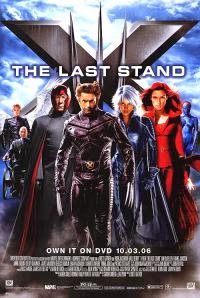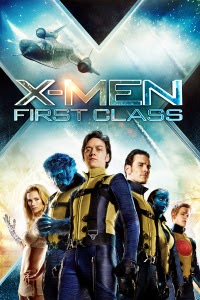SPOILERS!
One of my favorite reviews that I ever read was for a Rush album; the reviewer simply gave the album 3 stars and wrote "If you're a Rush fan, add two starts; if you're not, subtract two".
X-men: Days of Future Past is kind of like that. Fans of X-men and the series of films in particular, will love it. Honestly, I'm not sure what someone who is completely unfamiliar with the franchise would make of it. Granted, this sort of thing is less problematic these days as fewer sequels are being made as stand alone films; you can't just watch the last
Harry Potter movie without watching the first.
However, since I am, in fact, one of those aforementioned X-men fanatics I can say this: I loved it! This is, basically, the X-men movie that I have wanted to see since I was 13-years-old. And that's really who this movie is mad for: the 13-year-old comic fan who doesn't give a rat's ass what anyone else thinks of the movie--- it should only give him what he wants to see. And that it does....
Still, this movie could have been mess; it probably should have been a mess. After all, it attempts to tie together 6 movies of varying quality and plot consistency (although, honestly, we can probably ignore the two Wolverine films as they don't really factor that much into the plot--- even the origins material was covered sufficiently in
X2). Add to that a time travel storyline that, when examined with any scrutiny, creates more questions than answers (as is illustrated
here).
What allows me to suspend my disbelief is that, despite whatever plot holes are produced by the convoluted plot, the film maintains a strong emotional center. As it was in
First Class, this emotional core is built around the triumvirate of Charles Xavier, Magneto and Mystique. Xavier has fallen into a depression following the failure of his school; however, it quickly becomes clear, that depression can be traced back earlier, to the loss of his childhood friend, Raven/Mystique to Magneto's cause. It was a loss that
he is not quite as at peace with as he seemed to be at the conclusion of
First Class. He blames his old friend, Erik/Magneto, for her desertion and that has only served to further widen the rift in their friendship (that, and he also believes Magneto was behind the JFK assassination).
Once again, McAvoy and Fassbender bring depth and humanity to these men; they are not yet the iconic figures they will someday become, each representing a different side of the mutant issue; at this point, they are two friends on different sides of an argument. For her part, Jennifer Lawrence does a great job as we see Mystique's transformation into the femme fatale she will become in the original films; unlike
First Class where she came across very much like the girl next door (and, quite frankly, Lawrence's performance seemed phoned in). We're now seeing a character more akin to the one who, in
X2, slides through a closing doorway while giving her enemy the finger. Whether it's her Oscar Winning,
Hunger-Games-starring mojo at work or the fact that, maybe, she just found the development of her character more fun this time around, Lawrence owns the role (
Sidenote: the first time I taught my Superhero and Ethics class, I was surprised at the number of my young, female students who named Mystique as their favorite superhero; this was shortly after
First Class had come out and I'm sure Lawrence's portrayal had some small role in that and, after
Days of Future Past, I'm sure she'll have an even bigger fan base).
On a more superficial level, the movie just looks really cool. The future sequences look absolutely epic! The opening fight scene is brilliant. This is, in fact, the first time in an X-men movie (and maybe even any superhero movie---excepting maybe
Avengers) where we see a group of X-men fighting and using their powers
in tandem with one another, playing off of each others powers to fight their enemies. Coolest of all is Blink (the role doesn't have a lot of character depth to it but, damn, she looks cool as hell!) whose teleportive abilities are used to brilliant effect in combat against the sentinels.
Speaking of great sequences, Quicksilver's big moment in the pentagon jailbreak sequence is brilliant and a true highlight of the film. It has already been confirmed that the character will have a larger role in
X-men: Apocolypse and he deserves it. I'll bet even Whedon himself is now a little nervous about how his version of the character will be received in
Avengers 2.
Also, thankfully, the CG Beast of
First Class has been ditched in favor of practical make-up (fur is one of the most difficult things to animate realistically... duh!).
BIG SPOILER:
I think I'm not alone in my enjoyment of the film's conclusion; they lift a page right out of
Back to the Future and, rather than simply re-establishing the status quo of the present, they
improve it. Most notably, since Scott and Jean are now alive, it would seem as though
X-men: The Last Stand, the weakest in the series,
never happened (and for that matter, much of
X-men Origins: Wolverine and
The Wolverine probably never happened either). In fact, the refined present was so ideal that I half expected older Professor X and Magneto to come in from their tennis match to find a box filled with Professor X's newest book on Mutant/Human harmony and assuring Wolverine that he can accomplish anything if he puts his mind to it....
In more ways than one,
X-men: Days of Future Past serves to reshuffle the deck on the franchise in a way that the future films will have a fresh start; how well that plays out remains to be seen. We already know that
X-men: Apocalypse and a third
Wolverine are in the works. Beyond that, who knows? Will they go back and do an
X-men 4, picking up where
Days of Future Past left us? It has already been confirmed that
Apocalypse will take place in the 80's and feature the
First Class line up --- so will this further explain what happened in the time between the past and future of
Future Past? But, for what it's worth,
Days of Future Past manages to work on multiple levels and, quite frankly, maybe they should just leave well enough alone. They tied together most of the loose ends, smoothed over some inconsistency, and even undid some of the errors they made with the weaker links in the franchise--- so why not just go out on a high note?

 I wasn't feeling this one as much as previous Jack White projects, but it is still one of the musically more interesting albums of the year.
I wasn't feeling this one as much as previous Jack White projects, but it is still one of the musically more interesting albums of the year.  For what is basically an odds and ends collection, this manages to sound fresh and hold together nicely. The rocked out version of "The Ghost of Tom Joad" and "American Skin" had both been around as live versions for years but the proper studio recordings serve them well.
For what is basically an odds and ends collection, this manages to sound fresh and hold together nicely. The rocked out version of "The Ghost of Tom Joad" and "American Skin" had both been around as live versions for years but the proper studio recordings serve them well.  A pleasant surprise for old-school Wilco fans. Jeff Tweedy makes an album that harkens back to the days of Being There and Summerteeth.
A pleasant surprise for old-school Wilco fans. Jeff Tweedy makes an album that harkens back to the days of Being There and Summerteeth.  Despite the controversy of its release, it's still a pretty good album. Far from their best but still pretty far from terrible. "Raised By Wolves" and "The Troubles" make up for the mediocrity of the lesser tracks. (seriously, though, that cover is totally creepy)
Despite the controversy of its release, it's still a pretty good album. Far from their best but still pretty far from terrible. "Raised By Wolves" and "The Troubles" make up for the mediocrity of the lesser tracks. (seriously, though, that cover is totally creepy) An early contender for my favorite album this year, the early-Springsteen lyrics/vocals over Alt-rock/metal guitars delivers a unique punch. They might be the world's best bar band.
An early contender for my favorite album this year, the early-Springsteen lyrics/vocals over Alt-rock/metal guitars delivers a unique punch. They might be the world's best bar band.  Is it as good as The Blue Album? No. Of course not. Is it as bad as The Red Album? No. Far from it. It might actually be the best album they've done since regrouping in 2001.... it's as least as good as The Green Album. And the "Return to Ithaca" guitar-symphony might be my favorite musical moment of 2014.
Is it as good as The Blue Album? No. Of course not. Is it as bad as The Red Album? No. Far from it. It might actually be the best album they've done since regrouping in 2001.... it's as least as good as The Green Album. And the "Return to Ithaca" guitar-symphony might be my favorite musical moment of 2014. 
































